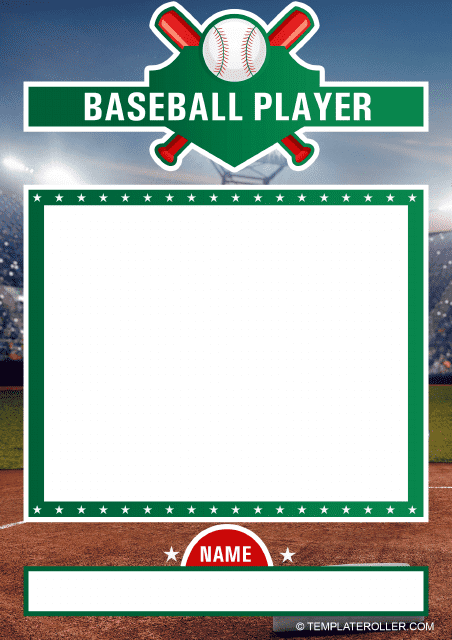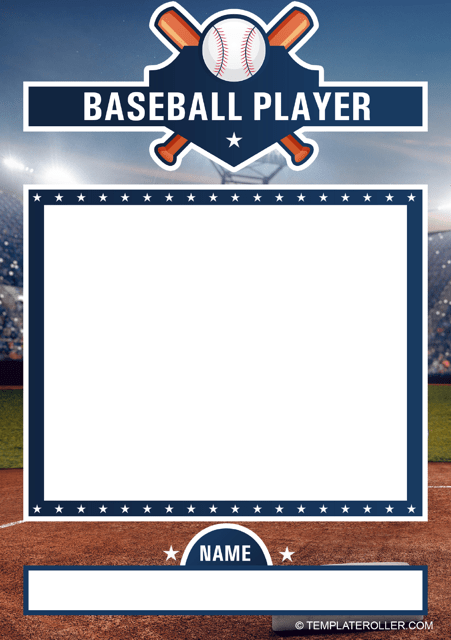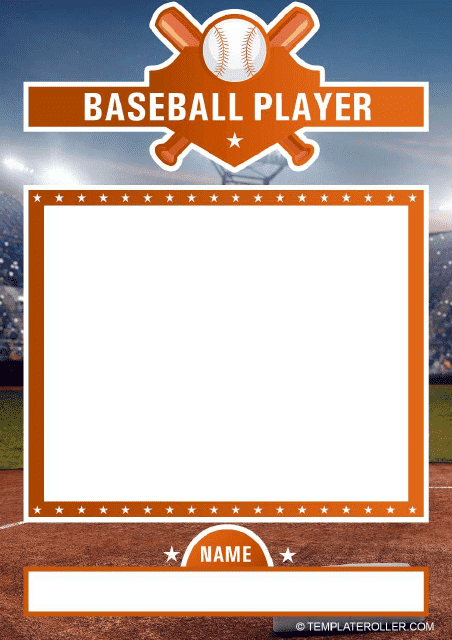Free Baseball Card Templates
Baseball Card: What Is It?
A Baseball Card is a trading card that contains biographical details of a particular baseball player, their career statistics, and a picture. Aspiring and experienced collectors alike hold vintage Baseball Cards in high esteem - they exchange them in person or by mail, chase rare editions, and build their collections by investing in these items. Furthermore, a personalized Baseball Card template you make as a gift or a bunch of the cards you customize for a passionate fan or young baseball player will show the recipient the effort and care you have put into a present.
For a full list of Baseball Card templates please check out our library below.
How to Make a Baseball Card?
Follow these simple instructions to fill out a blank Baseball Card template or create a custom trading card from scratch:
- Decide whether you will use both sides of the card or it may be enough to decorate the back of it with patterns or badges of teams . Opt for thick paper or card stock if you are making handcrafted trading cards without the help of any editing software. The standard size of a Baseball Card is 2.5x3.5 inches but of course, you may design a poster that looks exactly like a classic trading card.
- Insert or glue the picture of the player - you may choose an official photo or an image of them in action . Indicate the following information on the card: the name of the athlete, their brief biography, and statistics. Certainly, it is better to take advantage of the free space on the back of the card and describe the career of the baseball player in greater detail.
- Consider laminating the cards once you are done with your work - it will prevent numerous tears and marks making the collection safe even in the hands of a small child and enhance the look of the cards.
How to Find the Value of a Baseball Card?
It is often required to determine the Baseball Card Value whether you are looking to sell your collection or simply know how much it may potentially cost if you want to get rid of it later or include it in your inheritance. You should use online services available for collectors from any state - there are websites that will allow you to identify the card by the year it was issued, the manufacturer, the name of the player, and the unique number you can find on the back of the item. Besides, you may find experts whose specialty is the appraisal of Baseball Cards - reach out to independent evaluators and auction houses personally and send them scans of your collection with precise descriptions.
What Makes a Baseball Card Valuable?
The factors listed below will have an impact on the value of the Baseball Card:
- Current condition of the card . Examine the surface of the item and its edges and check it thoroughly for the presence of stains, spots, creases, and scratches. This is why you should purchase Baseball Card sleeves as soon as you come into possession of these items - these transparent plastic holders will let you archive the cards, keep them intact, and display the collection or several items you are proud of most.
- Print year . The reason is obvious - the older the card is, the less likely it has equivalents elsewhere making your item desirable for collectors. Pay attention to cards issued before World War II - their value is high while the condition may be far from what you are hoping for; moreover, you can expect vintage cards printed before the 1980s to be worth a lot since the mass production of these collectibles began. Note the time of the year the card was issued - generally, items printed by the end of the regular season could be obtained within a limited time which makes them less common.
- Player depicted on the card. It is quite logical to expect that legendary athletes will have a larger fanbase hence making the Baseball Cards with their photos more expensive and enticing due to sentimental reasons . Learn more about the person whose name you see on the card to find out if there is a large demand for it on the market.
- Confirmed authenticity . Collectors from every part of the country know - graded cards will cost more than ungraded ones. Grading means that a certified organization has already examined your items adhering to established standards - this will lower the upcoming expenses of the purchaser and save their time in case you have decided to part with the Baseball Cards.
- Errors and misprints . Surprisingly, trading cards with typos are more cherished in the collectors' world - these items are rare and people are frequently willing to pay more for a card that does not provide them with accurate details.
Still looking for a particular template? Take a look at the related templates below:
Documents:
3
This document is a baseball card template with a green color scheme. It can be used to create personalized baseball cards.
This type of document is a baseball card template featuring a blue color scheme. It is used to create personalized baseball cards for players or teams.
This document is a baseball card template with an orange color scheme. It can be used to create customized baseball cards.



